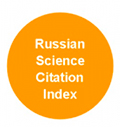Subjective perception of social inequality - the population opinion about social justice
Abstract
The concept of social justice is interdisciplinary and it is considered within various disciplines: philosophy, political science, history, sociology, and etc. The world experience of creating legal states is based on the idea of social justice. Social justice in economic relations is one of the most important aspects, which involves the creation of favorable conditions for equal access to the labor market. Social justice implies equal pay for equal work.
This article presents the results of the population survey about social justice in Russia, based on the sociological survey “Readiness for Change” in 2021. The survey program is included questions about the role of the state and social justice.
The analysis results show that the Russian population recognizes the objectivity of income differentiation, but believes that in society the differentiation is very high and the wage system is injustice. The access to quality health care services is the important problem. Respondents believe that high quality services should be provided to the entire population, and they perceive very negatively the possibility of people with high incomes to receive better services. Respondents believes that it is the responsibility of the state to regulate distribution relations and authority should reduce income differentiation.
It is shown that the main differentiating features of respondents' answers to questions about social justice are age and financial situation. The elderly and the poor rely more on the state and have a stronger sense of justice.
Downloads
References
Ильин В., Морев М., Поварова А. (2019). Является ли Россия социальным государством? Общество и экономика, 8, 5-36.
Капелюшников Р.И. (2021). Отдача от образования в России: ниже некуда? Вопросы экономики, 8, 37-68. https://doi.org/10.32609/0042-8736-2021-8-37-68
Кирута А.Я. (2011). Влияние неравенства на качество человеческого потенциала в России. Вестник института социологии, вып. 3, 67-87.
Лапин Н.И., Ильин В.А., Морев М.В. (2020). Экстремальные неравенства и социальное государство (часть 1). Социологические исследования, 1, 4-17.
Лежнина Ю.П. (2021). Представления россиян о необходимой социальной политике: между серединой 2000-х и коронавирусом 2020 года. Социологические исследования, 4, 50-60.
Острая Т.Б. (2006). Социальное государство как инструмент достижения социальной справедливости. Известия Томского политехнического университета, 309(2), 238-241.
Пациорковский В.В. (2021). Социальная справедливость—основа общественного согласия в современном обществе. Народонаселение, 24(1), 4-14. https://doi.org/10.19181/population.2021.24.1.1
Петросян Д. (2007). Социальная справедливость в экономических отношениях: институциональные аспекты. Вопросы экономики, 2, 59-67.
Петухов В.В., Петухов Р.В. (2019). Запрос на перемены: причины актуализации, ключевые слагаемые и потенциальные носители. Полис. Политические исследования, 5, 119-133. https://doi.org/10.17976/jpps/2019.05.09
Пишняк А., Корчагина И., Горина Е., Тер-Акопов С. (2021). Материальное положение россиян в условиях пандемии: влияние государственной поддержки. Экономическая политика, 16(6), 70-93. https://doi.org/10.18288/1994-5124-2021-6-70-93
Попова И.П. (2016). Социальная справедливость в научных дискуссиях 1990-2010-х годов. Мир России, 3, 57-75.
Adams J.S. (1965). Inequality in social exchange. Advanced Experimental Psychology, 62, 335-343
Huseman R.C., Hatfield J.D. Miles E.W. (1987). A new perspective on equity theory: the equity sensitivity construct. The Academy of Management Review, 12(2), 222-234.
World Bank (2020). Poverty and Shared Prosperity 2020: Reversals of Fortune /World Bank. Washington, DC: World Bank. https://doi.org/10.1596/978–1–4648–1602–4




















